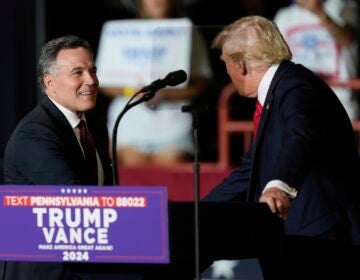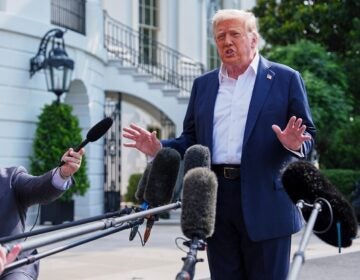Listing your laws that ‘ought to be,’ but likely won’t
A couple of weeks ago, I noted a gimmick by state Sen. Anthony Williams of Philadelphia, who was asking constituents to propose laws they thought the state legislature should pass.
I proposed a couple of “there-oughta-be-a” laws myself, some serious, some tongue in cheek, and invited all of you to send in yours.
A number of people replied, and we put some of them on the air this weekend, talking about their ideas. Here’s a rundown of many of the responses, with my comments after the proposed law..
Joseph Russell wanted a “a law banning corporate or PAC donations to candidates for office. I’m sick of companies funding candidates who let them get away with murder once they get elected.”
Amen, brother. Just one little problem: The United States Supreme Court, and its ever growing body of precedents embracing the (absurd) fiction that a corporation is the same thing as a flesh-and-blood person in the eyes of the law, and its equally ill-advised view that the spending of money equals speech.
In other words, it might be a good idea; it might make democracy work better; it might protect the interests of ordinary Americans better than the status quo. But it ain’t gonna happen until and unless we get a wholly different Supreme Court.
Howard Sherman picked up on Joseph Russell’s theme and took it to an hilarious place:
“Whenever they are on public business and especially when on TV, our elected representatives should be required to wear jackets emblazoned with the logos of their top 15 political donors, like NASCAR drivers.”
I’d vote for that law, Howard.
A reader with username cynicalobserver wants “all elected officials… to complete a civics course that includes, at a minimum, the writings of the Founding Fathers, to remind them that holding public office carries with it a duty to serve the common good.”
“Too many elected officials are swayed by private and special interests and lose sight of their obligation to consider the public welfare. Seems simple enough, but more often than not honored in the breach. Perhaps the course should include a showing of ‘Mr. Smith Goes to Washington’ as well. A little backbone goes a long way.”
Agree with the sentiment, cynicalobserver, but let’s acknowledge (as rarely happens) that the “Founding Fathers” were not a unanimous and saintly bunch, but a quarrelsome, cantankerous and often self-interested (cf. John Hancock) crew. They do not provide uniform wisdom that we can tap into at will. People can and often do cite words of the Founders do support diametrically opposed views. Thomas Jefferson, in particular, argued multiple sides of just about every philosophical issue during a long, voluble and intensely hypocritical life.
Michael Ned suggested that anyone is who is “on any type of government assistance and you are of sound mind and body, you must donate some of your personal time for community service.”
OK, Mr. Ned, as long as we understand that anyone who takes a tax deduction for the interest on their house mortgage is most definitely “on government assistance.”
Gerry Liebling is clearly a citizen of the Commonwealth who pays attention. Among the sought-for laws on Liebling’s list:
“1. Ethics: the Pennsylvania legislature has the loosest “ethics” rules in the country. A state senator takes a bribe in the form of a paid trip to the Super Bowl, but it’s OK because he declared it!!! How about some real ethics rules with teeth – and which are enforced?
“2. Redistricting: Pennsylvania is the most gerrymandered state in the country. With new apportionment we will get redistricted, and I’ll bet that things will not get any better. Some other states, like Florida, have logical, analytical, non-partisan computer programs to do redistricting which emphasize uniformity. How about Pennsylvania moving into the 21st century and do coherent redistricting?
“3. Legislative reform: Pennsylvania has the largest, most expensive, most ineffective state legislature in the country. How about some real legislative reform emphasizing reducing the size of the legislature?
“4. Marcellus shale extraction tax: Pennsylvania is the only state that has significant natural gas extraction that does not impose an extraction fee (I know you have ranted about this). How about imposing a fee with at least part of it going into a trust fund to deal with the inevitable ecological disaster from ground water pollution and release of methane into the atmosphere?”
Liebling for State Senate, anyone?
M. Ryan Gorman wants a simple, but probably impossible thing. He wants lawmakers to be required actually to read the laws they vote on and pass. He likens his idea to the Sarbanes-Oxley law, passed after Enron and similar corporate scandals, which requires corporate executives to sign off on the accuracy of their company’s financial statements.
He also proposed a complex but well-thought out version of that Holy Grail of corporate-funded politicians and judges: tort reform. (If you want to skip this complex topic, and read other folks’ ideas about bad driving and annoying ice cream trucks, page down a screen or so now.)
“In federal cases, I would bar contingent attorney fees (those fees that are a percentage of the value of any eventual judgement or settlement) on punitive damages. By this I mean a ‘split’ of the fees with representative counsel would be perfectly acceptable on actual damages, but punitive damages (which are presumably not actually aimed at making the plaintiff whole nor linked to actual calculated damages incurred, but instead aimed at penalizing the actions of the defendant to dissuade similar and similarly repugnant activities in the future) would not be split with representative counsel.
“Further, those punitive damages would be paid into a legal aid fund aimed at providing competent counsel for under-served communities and individuals of little means, thus furthering the theoretical goal of punitive damages by not only extracting a proverbial pound of flesh but also making the legal system more accessible for those who are similarly wronged.
“Since punitive damages were not actually making the plaintiff whole in the first place, the plaintiff remains “whole” (via traditional damages) under this approach and greater societal goals are simultaneously served by reducing incentives for parasitic non-parties (plaintiffs’ counsel — parasitic in the classic definition, not the pejorative) to drive up judgement and settlement costs that are eventually borne more broadly by consumers (for instance, healthcare customers).
“I believe this may be a politically feasible law because it does not set arbitrary caps for judgment (the traditional tort reform approach, loathed by the bar and the often liberal candidates funded by the bar at large), it does not insert the legislative branch into litigation within the judiciary branch (insertion of government into anything, including government, being generally a third rail among today’s Tea Party set), it removes the plaintiffs’ counsel incentive to strive for out-sized punitive damages (which I believe would have a modest, though surely positive, impact on overall costs and litigation volume in total), and it takes non-damages funds and redirects them to the very worthy cause of making our court systems available to those who need them most and can afford them least.”
OK, so maybe you didn’t follow all that, but having endured dozens of meetings in my days as an editorial page editor with the squabbling advocates on either side of the medical malpractice issue, I can tell you that this is a rare model of someone trying to craft a true compromise that honors values of both sides of a dispute.
Gorman for state Supreme Court, anyone?
Lester Brubaker wants to take aim at those who make laws:
“Establish term limits for legislators, strip legislators of the ability to establish their own salaries, benefits etc., reduce the number of legislative districts in the state, also reduce the number of legislators, redesign the system of funding public education in our schools.
“In terms of redesigning the number of legislative districts, I advocate a blending of rural areas with the large metropolitan areas to spread the unfair balance of power and control that now exists in the power bases of Philadelphia and Pittsburgh.”
While I understand and share some of the frustrations motivating this laundry list, I think many of the solutions are ill-aimed. Term limits do not work; they merely create a different set of problems, as lawmakers begin angling soon after arriving in a state Capitol for the cushy lobbying (etc.) jobs they will want once they are term-limited out of office. Reducing the number of districts makes a legislature less representative, not more, and only consolidates the power of big donors over the electoral process.
And the notion that Philadelphia controls what goes on in Harrisburg must seem hilarious to anyone who’s watched the state capital in recent years.
Naomi Miller has a similar idea to Gorman re: giving lawmakers a taste of their own medicine:
“Any member of a tax-levying legislative body must fill out their own tax returns; legislators may not use the advice of any accountant or other financial professional in filling out the forms.”
Think of how many requests for extensions on the filing deadline that would cause.
Christine Nelson also targeted the quirks of lawmakers:
“At the beginning of ever legislative session there should be a list of what has to be accomplished. No one gets to: go home, go on vacation or postpone a bill until everything is accomplished. As an auxillary to that law if a lawmaker is only working part-time hours they should only be paid on a part-time basis.”
Of course, Christine, first they’d have to agree on what should be accomplished. Have you listened to Eric Cantor and Nancy Pelosi lately?
Michael Taub was focused on quality of life issues:
“There oughta be a law that requires that the following two laws, already in existence, actually be enforced. this new law to require enforcement of current law is necessary, absurd as it sounds, because these two laws are NEVER enforced: (1) smokers who throw their cigarette butts on the street or sidewalk are to be cited and fined for littering and (2) drivers who block traffic by proceeding into an intersection when it is clear that they cannot clear the intersection prior to the light turning red are to be cited and fined for a moving violation.”
I would like there also to be a law that requires a driver whom I’ve just allowed to pull in front of me to acknowledge the small courtesy with a small wave. That’ll happen the same day Howard Sherman’s NASCAR label law goes into effect.
Another idea on a small quality-of-life issue from Richard Adelman, who’s pretty worked up about a summery topic:
“There ought to be a law governing until how late at night the ice cream truck can broadcast its repetitive jingle and how loud it is allowed to play the ‘music.’ Ideally, the truck should not be allowed to play after 8:30, and it should not play louder than necessary for the block its driving on. Moreover, there should be a price break on the license if the truck is equipped with simple jingle bells instead of a looping Turkey in the Straw or the awful circus tune of Mr. Softie. If the truck stops for more than a minute, the ‘music’ should cease until the truck resumes. After dark, and after a couple of minutes, there is nothing romantic or nostalgic about a loud, looping, mechanical noise.”
And the Creamsicles should be better, too!
Thanks to all who wrote or called in with ideas. And if you’re still reading all the way downnnnnnn here, it’s probably because you have an idea for a law you want to share.
Please feel encouraged to do so in the comment space below.
Stay cool and happy law-dreaming.
WHYY is your source for fact-based, in-depth journalism and information. As a nonprofit organization, we rely on financial support from readers like you. Please give today.




